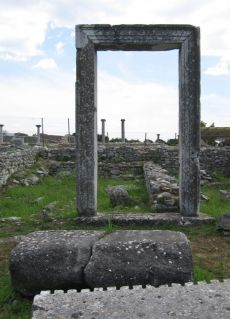Paul’s letter to the brethren in Philippi reveals his love for them and is a timeless message urging Christians to remain faithful and have unity in Christ.

Like every congregation that is part of the Church of God, Philippi had its own history, and Paul’s letter to the members there contains his thoughts about his imprisonment, the furtherance of the gospel, encouragement to remain faithful and encouragement for two ladies in the congregation to resolve their differences.
The book of Acts provides the chronology of Paul’s journeys and epistles. In Acts 16 we learn how the church in Philippi began.
The founding of the church in Philippi
On Paul’s second journey (A.D. 50-53) to establish congregations of the Church of God, he came to the city of Philippi. His travel there to preach the gospel was prompted by a vision he received of a man in Macedonia pleading with him to come to the area and help them (verse 9). Believing that God had called them “to preach the gospel to them,” Paul and his traveling companions—including Silas, Timothy and Luke—set off for Macedonia (verse 10).
Paul headed first for Philippi, “the foremost city of that part of Macedonia, a colony,” where they stayed “for some days” (verse 12). The fact that it was a colony meant “the citizens of Philippi could purchase, own, or transfer property. They also had the privilege of filing civil lawsuits in Roman courts and were exempted from paying both poll and land taxes” (The Nelson Study Bible).
The first converts
The earliest conversions to Christianity in Philippi did not occur in connection with a visit by Paul to a Jewish synagogue, as was typically the case during Paul’s travels. Perhaps because there weren’t sufficient Jewish males in the city for a synagogue to have been established, Paul and his companions “went out of the city to the riverside, where prayer was customarily made,” and they “spoke to the women who met there” (verse 13).
The first convert was a woman named Lydia, who was apparently a successful merchant. As the text notes, “The Lord opened her heart to heed the things spoken by Paul” (verse 14).
Soon thereafter, Paul cast a demon out of a slave girl who had a spirit of divination. He was taken to the authorities by her masters when they “saw that their hope of profit was gone” (verse 19). As a result, Paul and Silas were beaten and imprisoned. Then a strange thing happened.
At midnight, as Paul and Silas were praying and singing hymns, an earthquake shook the prison so violently that the prison doors were opened and the prisoners’ chains were loosed. The keeper of the prison feared that the prisoners had escaped and was preparing to kill himself. Just in time, Paul reassured him that all the prisoners were present and that there was no need to take his life. This then led to the baptism of the jailer and his household (verses 25-33).
Lydia and the jailer and their households were the first converts in the city. The first congregation of the Church of God in Europe had now been founded, and Paul soon left for Thessalonica (Acts 16:40; 17:1).
Date and circumstances relating to Paul’s letter
Paul’s letter to the brethren in Philippi was written while he was in prison in Rome (Philippians 1:13; 4:22). The books of Ephesians, Colossians and Philemon, along with Philippians, are known as Paul’s Prison Epistles.
Overview of ancient Philippi (photo courtesy Eric McLeod).
Philippians was likely written in A.D. 61 or 62. It appears Paul had been imprisoned for some time and anticipated a decision being made on his case shortly (2:23-24). There was also time for Epaphroditus to come to Paul from Philippi and for those in Philippi to learn of their messenger’s sickness (verses 25-27). Paul then sent Epaphroditus back to Philippi, presumably with his letter to the brethren (verse 28).
The greeting identifies the letter as coming from Paul and Timothy, who was with Paul in Rome. The letter is addressed “to all the saints in Christ Jesus who are in Philippi, with the bishops and deacons” (1:1). From its humble beginning about a decade earlier, the church had now grown into a mature congregation with ministers and deacons to lead and serve the members.
Paul’s relationship with the brethren
Even though Paul was “spitefully treated” by the people and civil authorities in Philippi at the founding of the congregation, Paul had a most tender relationship with the brethren.
Even though Paul was “spitefully treated” by the people and civil authorities in Philippi at the founding of the congregation (1 Thessalonians 2:2; Acts 16:16-24), Paul had a most tender relationship with the brethren. And through the years, the brethren supported him financially.
Consider that Paul did not accept tithes or offerings from the brethren in Corinth while he was with them because he thought doing so there might “hinder the gospel of Christ” (1 Corinthians 9:12). Yet he did receive aid from the members in Philippi while he was in Corinth (2 Corinthians 11:9).
Additionally, Paul received aid from the Philippian brethren when he was in Thessalonica (Philippians 4:16). The scriptural record also shows that Epaphroditus came from Philippi to care for Paul’s needs while he was imprisoned and that he brought Paul aid from the Philippian brethren (2:25; 4:18).
Some have suggested that there is no correction in this letter from Paul and that the congregation in Philippi was a practically perfect church. While the thrust of the letter is indeed primarily encouragement and a thank-you letter for the members’ support, a careful study of the text shows that there was also a situation in the congregation that needed to be resolved.
The problem was a disagreement between two leading women—Euodia and Syntyche. We don’t know to what extent the contention between these ladies had affected the congregation, but it certainly had this potential because both were prominent people who, Paul said, had “labored with me in the gospel.” Paul admonishes them “to be of the same mind in the Lord” and urges one identified as “true companion” to help them reconcile (4:2-3). We aren’t told who this “true companion” was.
The close relationship Paul had with the members in Philippi is reflected in his letter. Paul’s opening comments reveal that he is praying for the brethren, and he urges them to remain faithful (1:3-11). Of course, these are common themes in all of Paul’s epistles.
Here are two additional issues in this letter that evidence a close relationship between the apostle and the brethren in Philippi:
- Although he is in prison, Paul’s focus is on preaching the gospel. “But I want you to know, brethren, that the things which happened to me have actually turned out for the furtherance of the gospel, so that it has become evident to the whole palace guard, and to all the rest, that my chains are in Christ” (1:12-13). The furtherance of the gospel—through Paul’s ministry and the financial support from the Philippian brethren—created a common bond between them.
- Facing possible death from the unpredictable Emperor Nero, Paul shares his innermost thoughts regarding his continuing life or death with the brethren: “For to me, to live is Christ, and to die is gain. … For I am hard-pressed between the two, having a desire to depart and be with Christ, which is far better. Nevertheless to remain in the flesh is more needful for you” (1:21, 23-24).
Outline of Philippians
Here is a way the book of Philippians can be outlined:
Chapter 1: Introduction, personal update, encouragement.
- Greeting (1:1-2).
- Prayers for the brethren (1:3-11).
- A report on the advance of the gospel and Paul’s imprisonment (1:12-26).
- Encouragement to have conduct worthy of the gospel (1:27-30).
Chapter 2: Teaching on Christian conduct.
- Unity and spiritual growth come through having the mind of Christ (2:1-11).
- Encouragement to be lights in the world (2:12-18).
- Examples of good conduct—Timothy and Epaphroditus (2:19-30).
Chapter 3: Teaching on righteousness and perseverance.
- The superiority of righteousness by faith over righteousness by the law (3:1-11).
- The need to press toward our spiritual goal (3:12-21).
Chapter 4: Appeal for unity, a thank-you from Paul, final greetings.
- Standing fast in the Lord means getting along with others (4:1-9).
- Paul’s gratitude to the Philippians for their financial support (4:10-20).
- Final greetings (4:21-23).
Key messages of Philippians
While the book addresses many important subjects, and we encourage you to read the entire book, here are a few concepts to note.
The archaeological site at ancient Philippi (photo courtesy Eric McLeod).
Writing from prison, Paul knew firsthand what it meant to suffer for Christ, yet he didn’t resent this or feel sorry for himself. He wrote, “For I have learned in whatever state I am, to be content” (4:11). We, too, need to learn to be content. We must be willing to withstand persecution for being Christians. As Paul wrote, “For to you it has been granted on behalf of Christ, not only to believe in Him, but also to suffer for His sake” (1:29).
Another of Paul’s key messages was to “let this mind be in you which was also in Christ Jesus” (2:5). Christ’s example of humility, respecting others and dying to pay the penalty of our sins set a high standard for us. The more we take on the mind of Christ, the easier it will be for us to grow spiritually and be “like-minded, having the same love, being of one accord, of one mind” with fellow believers (2:2).
The record of the Philippians’ financial support of Paul (2:25; 4:18) reminds us of our privilege to support the preaching of the gospel of Jesus Christ and the coming Kingdom of God. The Philippians set a good example of doing this. For further study on how you can help support God’s work today, see “Tithing: What Is It?”
For more background on Paul and his letters, see “What Are the Pauline Epistles?.”
For a quick link to all the other books of the Bible, see “Books of the Bible” on the Learning Center.





